Learn how to develop for the Linux kernel. In this instructor-led course you’ll learn how Linux is architected, the basic methods for developing on the kernel, and how to efficiently work with the Linux developer community. If you are interested in learning about the Linux kernel, this is the definitive course on the subject.
Linux Kernel Internals and Development (LFD420)



 Introduction
Introduction
- Who You Are
- The Linux Foundation{
- Copyright and No Confidential Information
- The Linux Foundation{ Training
- Certification Programs and Digital Badging
- Linux Distributions
- Platforms
- Preparing Your System
- Using and Downloading a Virtual Machine
- Things Change in Linux and Open Source Projects
- Documentation and Links
 Preliminaries
Preliminaries
- Kernel Versions
- Kernel Sources and Use of git
- Labs
 How to Work in OSS Projects **
How to Work in OSS Projects **
- Know Where the Code is Coming From: DCO and CLA
- Stay Close to Mainline for Security and Quality
- Study and Understand the Project DNA
- Figure Out What Itch You Want to Scratch
- Identify Maintainers and Their Work Flows and Methods
- Get Early Input and Work in the Open
- Contribute Incremental Bits, Not Large Code Dumps
- Leave Your Ego at the Door: Don't Be Thin-Skinned
- Be Patient, Develop Long Term Relationships, Be Helpful
 Kernel Architecture I
Kernel Architecture I
- Monolithic and Micro Kernels
- Object-Oriented Methods
- Main Kernel Components
- User-Space and Kernel-Space
 Kernel Programming Preview
Kernel Programming Preview
- Task Structure
- Memory Allocation
- Transferring Data between User and Kernel Spaces
- Object-Oriented Inheritance - Sort Of
- Linked Lists
- String to Number Conversions
- Jiffies
- Labs
 Modules
Modules
- A Trivial Example
- Compiling Modules
- Modules vs Built-in
- Module Utilities
- Automatic Module Loading
- Module Usage Count
- The module struct
- Module Licensing
- Exporting Symbols
- Resolving Symbols **
- Labs
 Kernel Architecture II
Kernel Architecture II
- Process Context
- Kernel Preemption
- Real Time Preemption Patch
- Dynamic Kernel Patching
- Run-time Alternatives **
- Porting to a New Platform **
- Labs
 Kernel Initialization
Kernel Initialization
- System Boot
- Das U-Boot for Embedded Systems**
- Kernel Startup
 Kernel Configuration and Compilation
Kernel Configuration and Compilation
- Kernel Browsers
- Kernel Configuration Files
- Kernel Building and Makefiles
- initrd and initramfs
- Labs
 System Calls
System Calls
- Available System Calls
- How System Calls are Implemented
- Adding a New System Call
- Labs
 Kernel Style and General Considerations
Kernel Style and General Considerations
- kernel-doc **
- Using Generic Kernel Routines and Methods
- Making a Kernel Patch
- sparse
- Using likely() and unlikely()
- Writing Portable Code, CPU, 32/64-bit, Endianness
- Writing for SMP
- Writing for High Memory Systems
- Power Management
- Keeping Security in Mind
- Mixing User- and Kernel-Space Headers **
- Labs
 Race Conditions and Synchronization Methods
Race Conditions and Synchronization Methods
- Atomic Operations
- Bit Operations
- Spinlocks
- Seqlocks
- Disabling Preemption
- Mutexes
- Semaphores
- Completion Functions
- Read-Copy-Update (RCU)
- Reference Counts
- Labs
 SMP and Threads
SMP and Threads
- Processor Affinity
- CPUSETS
- SMP Algorithms - Scheduling, Locking, etc.
- Per-CPU Variables **
- Labs
 Processes
Processes
- The task_struct
- Creating User Processes and Threads
- Creating Kernel Threads
- Destroying Processes and Threads
- Executing User-Space Processes From Within the Kernel
- Labs
 Process Limits and Capabilities **
Process Limits and Capabilities **
- Capabilities
- Labs
 Monitoring and Debugging
Monitoring and Debugging
- Tracing and Profiling
- sysctl
- SysRq Key
- oops Messages
- Kernel Debuggers
- debugfs
- Labs
 Scheduling
Scheduling
- SMP
- Scheduling Priorities
- Scheduling System Calls
- The 2.4 schedule() Function **
- O(1) Scheduler **
- Time Slices and Priorities
- Load Balancing
- Priority Inversion and Priority Inheritance **
- The CFS Scheduler
- Calculating Priorities and Fair Times
- Scheduling Classes
- Scheduler Details
- Labs
 Memory Addressing
Memory Addressing
- Systems With and Without MMU and the TLB
- Memory Addresses
- High and Low Memory
- Memory Zones
- Special Device Nodes
- NUMA
- Paging
- Page Tables
- page structure
- Kernel Samepage Merging (KSM) **
- Labs
 Huge Pages
Huge Pages
- Transparent Huge Pages
- libhugetlbfs
- Labs
 Memory Allocation
Memory Allocation
- Buddy System
- Slabs and Cache Allocations
- Memory Pools
- kmalloc()
- vmalloc()
- Early Allocations and bootmem()
- Memory Defragmentation
- Labs
 Process Address Space
Process Address Space
- Locking Pages
- Memory Descriptors and Regions
- Access Rights
- Allocating and Freeing Memory Regions
- Page Faults
- Labs
 Disk Caches and Swapping
Disk Caches and Swapping
- Page Cache Basics
- What is Swapping?
- Swap Areas
- Swapping Pages In and Out
- Controlling Swappiness
- The Swap Cache
- Reverse Mapping **
- OOM Killer
- Labs
 Device Drivers**
Device Drivers**
- Device Nodes
- Character Drivers
- An Example
- Labs
 Signals
Signals
- Available Signals
- System Calls for Signals
- Sigaction
- Signals and Threads
- How the Kernel Installs Signal Handlers
- How the Kernel Sends Signals
- How the Kernel Invokes Signal Handlers
- Real Time Signals
- Labs
 Closing and Evaluation Survey
Closing and Evaluation Survey
Be proficient in the C programming language, basic Linux (UNIX) utilities such as ls, grep and tar, and be comfortable with any of the available text editors (e.g. emacs, vi, etc.) Experience with any major Linux distribution is helpful but not strictly required.











